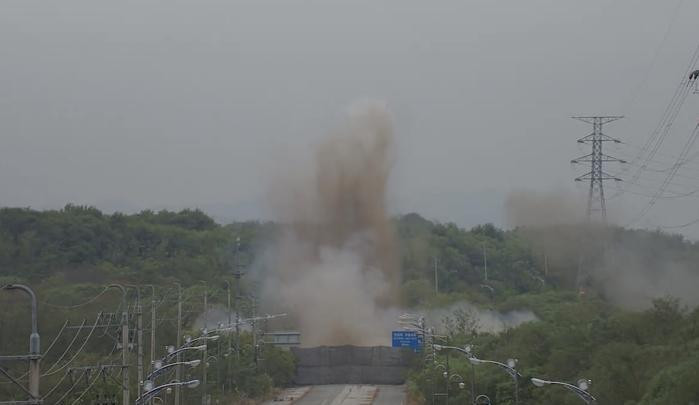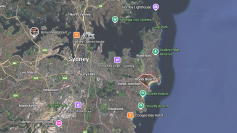North Korea escalated tensions on the Korean Peninsula on Tuesday by demolishing key inter-Korean roads and rail links along its heavily fortified border with South Korea. The move came just days after Pyongyang warned it would sever all ties with its southern neighbor, signaling a sharp shift away from any future reconciliation efforts. The destruction was confirmed by South Korea's Joint Chiefs of Staff (JCS), who said the explosions occurred at noon and targeted sections of the Gyeongui and Donghae lines-two major routes connecting the two Koreas along the west and east coasts, respectively.
While the infrastructure had been largely unused for years, the symbolism of the act has drawn attention amid an ongoing war of words and military posturing between North and South Korea. Video footage released by South Korea's Defense Ministry showed dramatic explosions on the northern side of the military demarcation line, followed by heavy machinery arriving to further dismantle the damaged roads.
In response to the destruction, South Korea's military fired warning shots south of the demarcation line and stated it would maintain full military readiness in cooperation with U.S. forces. South Korea's JCS emphasized that they are closely monitoring North Korean movements and maintaining a heightened alert.
North Korea prepares for war? They blow up the roads and rails that used to connect the North and the South. Kim Jong Un has ordered artillery units to move near the border with ‘readiness to engage’. If the US starts a war with Iran WW3 is guaranteed. pic.twitter.com/lOfnFC4Z4Q — Kim Dotcom (@KimDotcom) October 15, 2024
The explosions follow Pyongyang's accusations last week that South Korea had flown propaganda-filled drones over the North's capital, Pyongyang. Kim Yo Jong, the powerful sister of North Korean leader Kim Jong Un, warned that Seoul would "pay a dear price" for the alleged incursion. The South Korean government has not confirmed whether its military or civilians were behind the alleged drone flights, declining to provide details.
Tensions have been escalating between the two nations in recent months. In January 2023, Kim Jong Un declared that North Korea would no longer seek reunification with South Korea, abandoning a longstanding policy of peaceful reconciliation. He described inter-Korean relations as a "relationship between two hostile countries and two belligerents at war." This shift has been marked by increasingly hostile actions and rhetoric, culminating in Tuesday's road demolitions.
South Korea's Unification Ministry condemned the latest actions by North Korea, calling them a violation of past inter-Korean agreements. Ministry spokesperson Koo Byoung-sam described the incident as "highly abnormal" and expressed regret over Pyongyang's "regressive behavior." The ministry also noted that these roads and railways had been part of a significant inter-Korean cooperation project aimed at fostering reconciliation, with South Korea providing over $132 million in loans to support the construction. North Korea is still obligated to repay these loans, despite the destruction of the infrastructure.
North Korea's aggressive actions have drawn international concern, with China urging both sides to avoid escalating the conflict. Chinese Foreign Ministry spokesperson Mao Ning expressed Beijing's desire for "calm and restraint" in a statement following the incident.
The demolition of the cross-border infrastructure is just the latest in a series of provocations by North Korea. Earlier this month, Pyongyang dismantled its remaining roads and railways connected to the South, signaling a complete break in ties. North Korea's general staff stated that the acute military situation on the peninsula necessitated "more resolute and stronger measures" to protect the nation's security. The decision came in response to U.S. military exercises in South Korea, which have drawn sharp rebukes from Pyongyang.
South Korean President Yoon Suk-yeol has also warned that if North Korea uses nuclear weapons, it would "face the end of its regime." The rhetoric has been matched by North Korea's threats of nuclear retaliation. Kim Jong Un recently announced that the North would use nuclear weapons to destroy South Korea if attacked, further stoking fears of an escalation into broader conflict.
Experts, including Leif-Eric Easley, a professor at Ewha Womans University in Seoul, suggest that North Korea's moves may be aimed at diverting attention from its economic struggles. "Kim Jong Un wants domestic and international audiences to believe he is acting out of military strength," Easley said, "but he may actually be motivated by political weakness." Easley added that the North's actions reflect its regime's survival strategy, which involves exaggerating external threats to justify its military buildup.
While North Korea fortifies its border, the South is ramping up efforts to prevent activists from sending anti-regime leaflets across the border. Gyeonggi Province, which borders North Korea, has announced that a special police force will be deployed to crack down on the practice, which has been a source of tension between the two Koreas for years.






